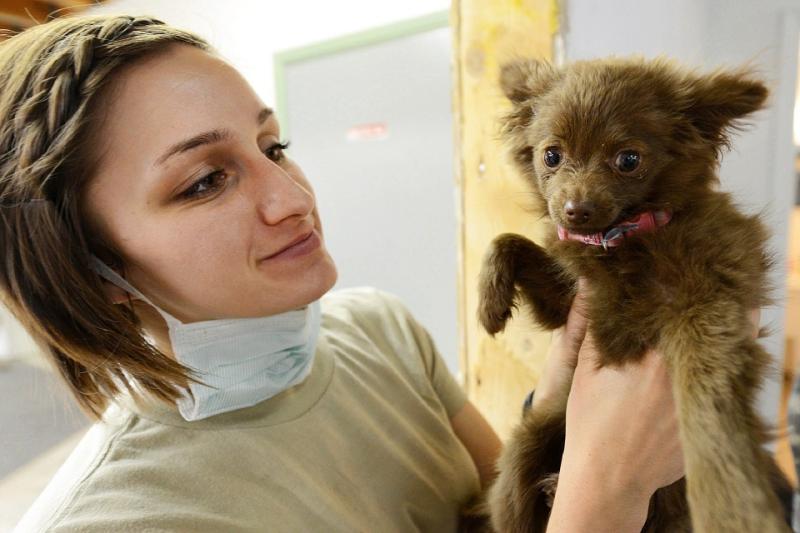Veterinarian

An education in neuroscience can provide students with an excellent background for a career as a veterinarian. Sample 4-year plans for pre-health neuroscience majors can be found on our Curriculum page. Professional programs have a number of pre-requisites which can be found on OSU's Pre-Professional Programs page. Note that several courses in the neuroscience major overlap with pre-health requirements including general genetics and biochemistry.
Additionally, performing neuroscience research can count toward your major but also looks great on an application to professional school! Students in the Neuroscience Program are currently conducting research in departments such as neurology, neuro-oncology, psychiatry, neurosurgery, ophthalmology, dentistry, biomedical engineering, etc.
Veterinarian
- Biochemistry 4511
- Microbiology 4000
- Physiology 3200 or Animal Science 3140
- Communication 2110 or 2131 or Agricultural Communication 3130
- Science electives: 35 hours (includes, but not limited to: biology, chemistry, anatomy, immunology, cell biology, molecular genetics, animal science, ecology, environmental science or other science courses.)
- Humanities/Social Science electives: 16 hours (Includes, but not limited to: history, economics, anthropology, psychology, art, music, literature, languages, writing, and ethics.)
There are many things that you can do besides academics that will make you an excellent candidate for professional school in a healthcare field:
- Quality volunteer experience is crucial! Professional programs want to see that you are well-prepared for your intended career. These experiences should demonstrate:
- An ability to work with a variety of people
- Leadership
- Philanthropy
- Commitment
- Extensive exposure to your intended career (i.e. you know what you are getting into!)
- Shadowing
- Work in a veterinary clinic
- Extracurricular activities
- Personal letters of recommendation from faculty and/or professionals who know you well and can vouch for your strength of character and academic potential. Get to know potential letter writers early by standing out in class, attending office hours, and communicating regularly.
- Strong essays that demonstrate your individuality and indicate a passion for the profession.
- Research experience is helpful but volunteer experience is more important. Additionally, research work with animals may help prepare you for some parts of being a veterinarian.
Applications to all U.S. veterinary schools are centralized through the Association of American Veterinary Medical Colleges (AAVMC) Veterinary Medical College Application Service (VMCAS). Most veterinary schools require the GRE; however, some require the Biology GRE specifically. Other schools accept the MCAT in place of the GRE. Check individual programs for specific requirements.
What does my GPA need to be?
It depends on the program; their website should have admissions statistics. That being said, anything less than a 3.0, particularly in pre-requisite classes, will make it difficult to find a school that will seriously consider your application.
What do my test scores need to be?
It depends on the program; their website should have admissions statistics.
What classes count toward my science GPA?
Some programs ask for you to calculate your science GPA. Of course, general science courses like chemistry, physics, and biology are included in this as are most of your neuroscience classes. However, be sure to contact individual programs to confirm eligibility.
When should I take the GRE?
The GRE should be completed at least 6 weeks before you apply.
What is the GRE like?
The GRE tests your verbal, quantitative and analytical writing abilities. See the ETS site for more information.
How do I shadow a clinician? Is there some kind of program for which I can register?
Unfortunately, OSU does not have any set program for clinician shadowing. It is up to you to find a willing clinician. You can do so by contacting a local animal hospital. It may be easier to find someone if you are already a volunteer at their place of work.
What do you mean by 'quality' volunteer experience?
Quality volunteer experience puts you into direct, personal contact with a variety of people and animals. This can be in a medical setting, such as a veterinary clinic, or a non-medical setting like an animal shelter. Other good opportunities include volunteering with 4-H or doing farm work. Experience with animals is highly recommended, but volunteer experience with humans is also welcome on veterinary school applications. Additionally, not all of your volunteer experience needs to be strictly medical- for example, working at a homeless shelter where you interact daily with disadvantaged individuals would be far more valuable of an experience than directing visitors to different hospital departments.
What kinds of extracurricular activities are best?
Anything that you are passionate about! Professional schools are interested in recruiting a diverse group of people with a variety of interests.
I'm not sure if neuroscience is the right major for me. Would it look bad if I majored in [any major]?
No. Professional schools generally do not care what your undergraduate major is. OSU Medical School's entering class of 2014 included students majoring in neuroscience, finance, theology, and history.
Which specialization is best for pre-veterinary?
It doesn't matter which specialization you choose- just pick the one that you like the best and that will inspire you to do well.
Would it look bad if I took time off?
Absolutely not! Many professional schools look favorably on older applicants because they are generally more mature and have more extensive life and work experience. If you choose to take time off, however, make sure that you are still doing things to enhance your application (volunteering, etc.).
I don't think I want to pursue a career in healthcare anymore. What else can I do?
Majoring in neuroscience provides you with broad scientific literacy that will prepare you for a variety of careers. Visit our Careers page for a list of other options.

